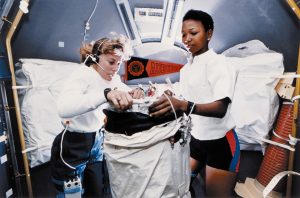
Can women be astronauts? This seems to have been a theme on the BBC over the last couple of weeks, with two different TV programmes addressing issues of career gender roles and stereotypes. The first, ‘No more boys and girls’, documented the work of Dr Abdelmoneim and his experiment to examine whether making small interventions to the classroom environment could change the strict gender-typed views of 7 year olds. The premise was a good one: To challenge traditional stereotypes about what boys and girls can do by pointing out equalities rather than differences. The execution? A developmental psychologist might be left saying ‘Hmmm’. No verbal matching. No matched control group. Massive long tasks for busy parents to complete. Sweeping conclusions based on a handful of children in a community school on the Isle of Wight. It actually downplayed the fantastic work that many schools across the UK are already doing to promote gender neutrality in schools. There are girls’ football teams. Children may well have seen a male ballet dancer. And most 7 year olds probably know that a woman can go into space too. Great that it made parents stop to think about the influence they were having. And great that some of the girls came away with higher self-esteem whilst some of the boys found a new love of sewing. But ground-breaking or revolutionary, it was not.
Perhaps more encouraging was Sunday night’s documentary about 12 astronaut applicants. Where men and women from all sorts of backgrounds (From surgeon to mountaineer to PhD student-come-ballet dancer) were filmed going through the rigour of the astronaut selection process. No fuss was made about the gender, age or background of each person. It was simply about how difficult a profession it is and how much each individual had achieved to get so far. Showing how everyone overcomes their own barriers and that gender or race have nothing to do with ambition. So perhaps this is the way to teach children about gender equality. Instead of priming them with tasks that are all about gender expectations, actually just let them see, without the labels or rules, what any individual is capable of.
What do you think works best to teach our next generation that the presence of a Y chromosome (or not) doesn’t matter? How can we encourage true gender equality in our youth…?
